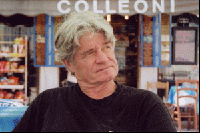You reached this page through the archive. Click here to return to the archive.
Note: This article is over a year old and information contained in it may no longer be accurate. Please use the contact information in the lower-left corner to verify any information in this article.
Visiting scholar will share experiences as activist, organizer
February 14, 2008
As a social justice activist and trade union organizer, Robert Muehlenkamp has spent his career working to promote fair and just lives for a wide variety of people.
 |
| Robert Muehlenkamp |
His Feb. 19 lecture, which will begin at 7 p.m. in Buntrock Commons' Viking Theater, is titled "The American Labor Movement: Dingbats, Dinosaurs or Dynamic Duo." Several days later, Muehlenkamp will participate in a moderated discussion with Javier Morrillo-Alicea, president of the Service Employees International Union Local 26 in Minneapolis. The Feb. 22 discussion, titled "Labor Issues in a Period of Globalization," will begin at 3:30 p.m. in Buntrock Commons' Black and Gold Ballroom.
The Woodrow Wilson Visiting Scholar comes to campus each year in conjunction with St. Olaf's Globalization and Social Responsibility Conference that this year will be held Feb. 22-23 and will focus on the theme of "Working for the Common Good." The Woodrow Wilson Visiting Scholar program is coordinated at St. Olaf by the Center for Experiential Learning.
Muehlenkamp has been active in the social justice and trade union movements for more than 35 years. He is the founder of the "Wake Up Wal-Mart" campaign and is the co-founder of U.S. Labor Against the War in Iraq. He was one of three coordinators for the 1982 Peace Rally in Central Park and was a senior adviser to Gov. Howard Dean's presidential campaign. He is currently applying Internet and e-mail techniques to various union and social justice campaigns in addition to teaching at the University of Maryland.
After earning a B.A. from Marquette University, Muehlenkamp earned an M.A. from the University of Chicago. He was a University of Wisconsin Ph.D. student in the late 1960s and attended the University of Maryland Law School in the early 1970s.
As he prepared to visit St. Olaf, Muehlenkamp answered several questions about his experiences and what he hopes the campus community will learn from his visit.
How did you get involved in the social justice and trade union movements?
I was fortunate to be in college during the '60s. I started to get involved in antiwar activity while at the University of Chicago, then [got involved in] the civil rights movement. Then while working on my doctorate and teaching at the University of Wisconsin, I helped to start the teaching assistants' union and was its founding president. From there I became a union organizer.
You've had a variety of interesting organizing experiences, from leading the hospital workers union to coordinating a peace rally in Central Park to serving as an adviser to Gov. Howard Dean's presidential campaign. Which role have you enjoyed the most or felt was most rewarding?
It all fits together. What matters most is that workers have some rights on their jobs and decent pay and benefits and security. Wars, and the politics and budgets that go with war, threaten all that. That's also the reason I got involved with Dean -- to end this war. The key to all work is the ability to continue to learn.
You're currently applying Internet and e-mail organizing techniques to various union and social justice campaigns. How has the Internet changed these types of campaigns?
The Internet and digitalization is transforming struggles for social justice, as it is everything else. As each year goes by, workers and everyone will get their information and communicate over the Web, using many platforms. We can't bemoan the loss of traditional communities and identities that comes with this. We have to learn how to move people in this new world. And we have to continue to talk with and listen to people face to face.
How do you see the workplace changing as a result of globalization?
When you add 2 billion starving workers to a global workforce in only 25 years, you transform the workplace more than the industrial revolution.
What is the message or lessons you hope to impart while visiting St. Olaf next week?
"The economy is not like the weather."
